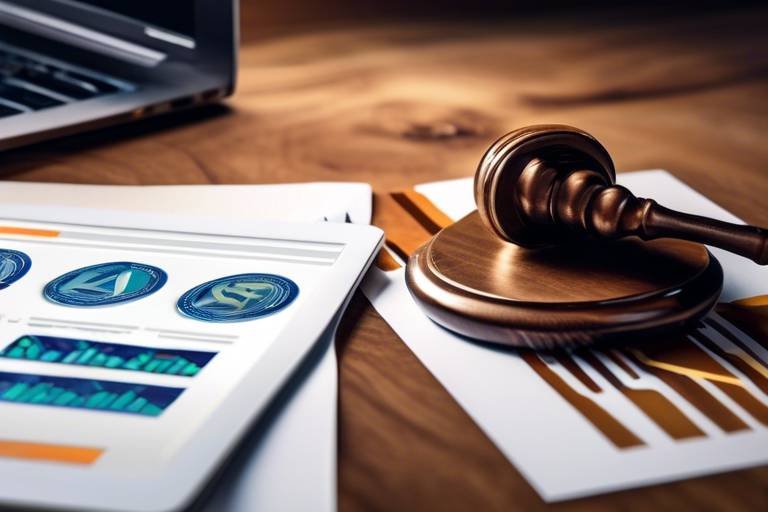The Role of Legal Counsel in Cryptocurrency Fundraising
In the fast-paced world of cryptocurrency, where innovation meets regulation, the role of legal counsel is not just important—it's crucial. As startups and established companies alike dive into the realm of digital currencies, they encounter a myriad of legal challenges that can make or break their fundraising efforts. Legal counsel acts as the compass in this uncharted territory, guiding organizations through the complexities of compliance, structuring, and risk management. Without their expertise, the fundraising journey could quickly turn into a legal nightmare, jeopardizing not only finances but also reputations.
Imagine navigating a dense forest without a map or a guide. That’s what fundraising in the cryptocurrency space feels like without legal counsel. The landscape is constantly shifting, with regulations evolving and new laws emerging almost daily. Legal experts help companies stay on the right path, ensuring they meet all necessary legal requirements while pursuing their fundraising goals. This article delves into the essential functions of legal counsel in cryptocurrency fundraising, focusing on regulatory compliance, risk management, and the vital importance of sound legal advice.
Legal counsel must grasp the evolving cryptocurrency regulations to ensure compliance with federal and state laws, safeguarding the fundraising process against potential legal pitfalls and penalties. The regulatory environment is a patchwork quilt of rules that can vary significantly from one jurisdiction to another. This complexity requires a deep understanding of both local and international laws, as non-compliance can lead to hefty fines and even criminal charges.
Moreover, legal counsel plays a pivotal role in keeping the organization updated on any changes in regulations. For instance, the introduction of new laws, such as the European Union's MiCA regulation, can have far-reaching implications for cryptocurrency fundraising. Legal experts are tasked with interpreting these laws and advising their clients accordingly, ensuring that they remain compliant while pursuing their fundraising strategies.
Legal experts play a vital role in structuring token offerings, ensuring that the tokens are categorized correctly and comply with securities laws to avoid misclassification and legal challenges. The classification of tokens can significantly impact how they are treated under the law, which is why legal counsel must be involved from the outset. They help in determining whether a token is a utility token, security token, or something else entirely, which in turn dictates the applicable legal framework.
Different types of token offerings, such as Initial Coin Offerings (ICOs) and Security Token Offerings (STOs), require distinct legal considerations that counsel must navigate to protect clients' interests. Here’s a brief comparison:
| Type of Offering | Regulatory Oversight | Investor Protections |
|---|---|---|
| ICOs | Less regulated | Limited protections |
| STOs | Highly regulated | Enhanced protections |
Understanding the differences between ICOs and STOs is crucial for legal counsel, as each type has unique regulatory implications and investor protections that must be addressed. ICOs typically offer tokens that provide access to a platform or service, while STOs represent ownership in an asset, much like traditional securities. This distinction necessitates different legal frameworks, and counsel must ensure that the chosen structure aligns with the fundraising goals while adhering to applicable laws.
Legal counsel must prepare comprehensive documentation, including prospectuses and terms of service, to ensure transparency and compliance with applicable laws during fundraising efforts. This documentation serves as a roadmap for potential investors, outlining the risks, rewards, and operational details of the offering. In a world where trust is paramount, having clear and legally sound documentation can significantly enhance investor confidence.
Legal counsel must develop risk management strategies to mitigate potential legal risks associated with cryptocurrency fundraising, including fraud, regulatory scrutiny, and market volatility. The cryptocurrency landscape is fraught with uncertainties, and without a robust risk management plan, organizations can find themselves in precarious situations. Counsel needs to identify potential risks early on and implement strategies to address them effectively.
Legal counsel is responsible for implementing investor protection measures, ensuring that fundraising efforts are transparent and that investors are informed of the risks involved. This involves creating a culture of transparency where investors feel secure and informed about their investments. Legal experts guide organizations on how to communicate risks and other critical information to potential investors, fostering a relationship built on trust.
Counsel must advise on disclosure obligations, guiding clients on what information must be shared with potential investors to comply with legal standards and foster trust. Disclosures should cover a range of topics, including financial projections, risks, and the use of funds. By being upfront about potential pitfalls, organizations can build credibility and trust with their investors, which is invaluable in the often-skeptical world of cryptocurrency.
Legal counsel must be prepared to handle inquiries from regulatory bodies, providing timely and accurate responses to maintain compliance and protect the interests of the fundraising entity. Regulatory inquiries can arise unexpectedly, and having a legal expert on hand to manage these situations is essential. They can help navigate the complexities of regulatory communication, ensuring that the organization remains compliant while minimizing any potential fallout.
- What is the primary role of legal counsel in cryptocurrency fundraising? Legal counsel ensures compliance with laws, structures token offerings, and manages risks associated with fundraising.
- Why is understanding regulations important? Regulations are constantly evolving, and staying compliant helps avoid legal pitfalls and penalties.
- What are the differences between ICOs and STOs? ICOs are less regulated and offer utility tokens, while STOs are highly regulated and represent ownership in assets.
- How do legal counsel help with investor protection? They implement measures to ensure transparency and guide organizations on disclosure obligations.

Understanding Cryptocurrency Regulations
In the rapidly evolving world of cryptocurrency, one of the most critical aspects that legal counsel must navigate is the complex landscape of regulatory compliance. As governments around the globe scramble to catch up with the technological advancements presented by blockchain and digital currencies, the rules are constantly changing. This makes it essential for legal experts to stay updated on both federal and state laws to ensure that their clients' fundraising efforts do not fall into legal pitfalls that could lead to severe penalties.
Imagine trying to navigate a maze where the walls are constantly shifting. That's what it feels like for legal counsel in the cryptocurrency space. They need to understand the nuances of regulations that can vary significantly from one jurisdiction to another. For instance, in the United States, the Securities and Exchange Commission (SEC) plays a pivotal role in determining whether a token is classified as a security or not. This classification can dramatically impact the fundraising strategy, as securities are subject to stringent regulations that aim to protect investors.
Moreover, legal counsel must also be aware of international regulations, as cryptocurrency fundraising often attracts investors from various countries. Different nations have their own sets of rules, which can complicate compliance efforts. For instance, the European Union has been working on a comprehensive regulatory framework, while countries like China have adopted a more restrictive approach towards cryptocurrency activities.
To effectively guide their clients, legal professionals often rely on a few key strategies:
- Continuous Education: Staying informed about the latest regulatory changes is crucial. This might involve attending seminars, subscribing to legal updates, or engaging with industry experts.
- Risk Assessment: Evaluating the potential legal risks associated with a specific fundraising strategy helps in making informed decisions.
- Collaboration with Regulators: Building a relationship with regulatory bodies can facilitate smoother compliance and foster trust.
Ultimately, the role of legal counsel in understanding cryptocurrency regulations is not just about avoiding penalties; it's about enabling clients to innovate within a legal framework. By ensuring compliance with existing laws, legal experts help create an environment where fundraising can occur without the looming threat of legal repercussions. This not only safeguards the interests of the clients but also promotes a healthier ecosystem for investors.
As we dive deeper into the world of cryptocurrency fundraising, the importance of having a skilled legal team by your side cannot be overstated. They are the navigators in this ever-changing landscape, ensuring that all fundraising activities are conducted within the boundaries of the law.

Structuring Token Offerings
When it comes to cryptocurrency fundraising, the way tokens are structured is absolutely paramount. Legal experts serve as the architects of this complex framework, ensuring that every token offering is built on a solid foundation of compliance and legality. Just like a house needs a strong frame to stand tall against the elements, a token offering requires meticulous structuring to withstand regulatory scrutiny and market challenges. Without this careful planning, the entire fundraising effort can be jeopardized, leading to potential legal repercussions that can sink even the most promising projects.
One of the first steps in structuring a token offering is understanding how to categorize the tokens correctly. This is crucial because misclassification can lead to severe consequences, including hefty fines and legal action. Legal counsel must determine whether the tokens are classified as utility tokens, which provide access to a product or service, or as security tokens, which represent ownership in a company or asset. This classification is not merely a formality; it dictates the regulatory framework that governs the offering and the obligations that must be fulfilled. For instance, security tokens often come with stricter regulations, including registration requirements with government agencies.
There are various types of token offerings, each with its distinct legal considerations. The most common types include:
- Initial Coin Offerings (ICOs): These are perhaps the most well-known type of token offering, where new cryptocurrencies are sold to investors, often before the product is fully developed. ICOs have gained notoriety for their potential for high returns, but they also come with significant risks and regulatory challenges.
- Security Token Offerings (STOs): Unlike ICOs, STOs are regulated offerings that comply with securities laws, providing investors with legal protections. This type of offering is designed for investors who seek a level of security and regulatory oversight.
- Initial Exchange Offerings (IEOs): These are conducted on cryptocurrency exchanges, where the exchange acts as an intermediary. IEOs typically provide a layer of trust, as exchanges vet the projects before listing them.
Legal counsel must navigate these different types of offerings with precision, ensuring that each aligns with the client’s goals while adhering to the law. For example, while ICOs may offer a quicker path to fundraising, they also attract more regulatory scrutiny. On the other hand, STOs may take longer to launch due to compliance requirements but can offer greater protection to investors.
Another critical function of legal counsel in structuring token offerings is the preparation of comprehensive legal documentation. This includes creating prospectuses, which outline the details of the offering, and terms of service, which govern the use of the tokens. These documents serve as a roadmap for both the issuer and the investors, ensuring that everyone is on the same page regarding the rights and responsibilities involved in the token sale. Transparency is key here; investors are more likely to participate in offerings where they feel informed and secure.
Moreover, legal counsel must ensure that these documents comply with applicable laws and regulations. This means staying updated on the rapidly changing landscape of cryptocurrency regulation, which can vary significantly from one jurisdiction to another. A well-structured token offering not only protects the issuer from legal issues but also fosters trust with investors, paving the way for a successful fundraising campaign.
In addition to structuring the offerings, legal counsel must also develop robust risk management strategies. This involves identifying potential legal risks associated with the fundraising process, such as fraud, regulatory scrutiny, and market volatility. By proactively addressing these issues, legal experts can help clients navigate the turbulent waters of cryptocurrency fundraising with greater confidence.
In conclusion, structuring token offerings is a multifaceted process that requires a deep understanding of legal frameworks, investor protections, and market dynamics. Legal counsel plays a critical role in this process, ensuring that every aspect of the offering is compliant and strategically sound. As the cryptocurrency landscape continues to evolve, the importance of skilled legal guidance cannot be overstated.
What is the difference between an ICO and an STO?
ICOs are typically unregulated and can be riskier for investors, while STOs comply with securities regulations and provide more investor protections.
Why is legal documentation important in token offerings?
Legal documentation ensures transparency, compliance with laws, and helps build trust with investors, which is essential for a successful fundraising effort.
How can legal counsel help in risk management for cryptocurrency fundraising?
Legal counsel can identify potential legal risks, develop strategies to mitigate them, and ensure compliance with regulations to protect the interests of the fundraising entity.

Types of Token Offerings
When diving into the world of cryptocurrency fundraising, it's essential to understand the different types of token offerings available. Each type comes with its own set of legal considerations, compliance requirements, and investor protections that legal counsel must navigate to safeguard their clients' interests. Let's break down the two most popular types: Initial Coin Offerings (ICOs) and Security Token Offerings (STOs).
ICOs have gained significant popularity in the crypto space, often likened to crowdfunding campaigns where companies issue their own tokens in exchange for established cryptocurrencies like Bitcoin or Ethereum. These tokens can represent various utilities within a platform, and the appeal lies in their potential for high returns. However, ICOs can also be a legal minefield. Without proper legal guidance, companies risk misclassifying their tokens, leading to hefty penalties and loss of investor trust.
On the other hand, STOs are more structured and regulated. They are similar to traditional securities offerings, where tokens represent ownership in an asset or a share in the company. This type of offering is designed with investor protection in mind, adhering to securities laws that provide a level of security for investors. Legal counsel plays a crucial role in ensuring that the token is classified correctly and that all necessary regulations are followed, thus minimizing the risk of legal issues down the line.
To further illustrate the differences, consider the following table:
| Feature | Initial Coin Offering (ICO) | Security Token Offering (STO) |
|---|---|---|
| Regulation | Less regulated | Highly regulated |
| Investor Rights | Limited rights | Ownership rights and protections |
| Token Type | Utility tokens | Security tokens |
| Compliance Requirements | Minimal compliance | Extensive compliance |
In conclusion, understanding the types of token offerings is crucial for legal counsel. Each type carries distinct legal implications and risks that must be managed effectively. By providing sound legal advice and actively participating in the structuring of these offerings, legal professionals can help their clients navigate the complex landscape of cryptocurrency fundraising, ensuring compliance and protecting investor interests.
- What is the main difference between ICOs and STOs? ICOs are less regulated and often involve utility tokens, while STOs are highly regulated and involve security tokens that provide investor protections.
- Why is legal counsel important in token offerings? Legal counsel ensures compliance with regulations, helps structure offerings correctly, and protects both the fundraising entity and investors.
- What are the risks associated with ICOs? ICOs can lead to misclassification of tokens, regulatory scrutiny, and potential fraud, making legal guidance essential.

ICOs vs. STOs
The distinction between Initial Coin Offerings (ICOs) and Security Token Offerings (STOs) is crucial for legal counsel navigating the complex landscape of cryptocurrency fundraising. At first glance, both ICOs and STOs may seem similar, as they both involve raising capital through the issuance of tokens. However, they cater to different regulatory frameworks and investor expectations, which can significantly impact the legality and success of a fundraising campaign.
ICOs are often likened to crowdfunding campaigns in the tech world, where startups offer their tokens to the public in exchange for funds, typically in the form of established cryptocurrencies like Bitcoin or Ethereum. The allure of ICOs lies in their potential for high returns, as early investors may gain access to innovative projects at ground level. However, this potential comes with a significant caveat: the lack of regulatory oversight can lead to scams and fraudulent schemes, leaving investors vulnerable. Legal counsel must ensure that the ICO complies with applicable laws, primarily focusing on whether the tokens being issued are classified as securities.
On the other hand, STOs are designed to comply with securities regulations from the outset. They offer a more structured approach to fundraising, where the tokens represent ownership in an asset, such as equity or debt. This means that STOs are subject to rigorous regulatory scrutiny, providing a layer of protection for investors. Legal counsel plays a vital role here, ensuring that all aspects of the offering align with the relevant securities laws and that proper disclosures are made to potential investors.
To illustrate the differences further, consider the following table:
| Aspect | ICOs | STOs |
|---|---|---|
| Regulatory Compliance | Less regulated | Heavily regulated |
| Investor Protections | Limited | Comprehensive |
| Token Classification | Utility tokens | Security tokens |
| Target Investors | General public | Accredited investors |
In summary, while both ICOs and STOs present unique opportunities for fundraising, they come with distinct legal implications that must be meticulously navigated. Legal counsel must not only understand these differences but also be proactive in advising clients on the best approach to take based on their specific fundraising goals and the regulatory environment they operate within. The choice between an ICO and an STO can be likened to choosing between a high-risk investment and a more secure, regulated option; the former may offer the thrill of potential high returns, while the latter provides a safety net for both the issuer and the investor.
- What is the primary difference between ICOs and STOs? ICOs are less regulated and often involve utility tokens, while STOs comply with securities regulations and involve security tokens.
- Why are STOs considered safer for investors? STOs offer comprehensive investor protections and are subject to rigorous regulatory scrutiny, unlike ICOs.
- Can a token be both a utility and a security? Yes, depending on how the token is marketed and the rights it provides, it may fall under both categories.

Legal Documentation Requirements
When it comes to cryptocurrency fundraising, the importance of legal documentation cannot be overstated. This documentation acts as the backbone of the fundraising process, ensuring that all activities are transparent and compliant with applicable laws. Legal counsel must prepare a variety of documents, each serving a unique purpose in protecting both the fundraising entity and its investors. Among these documents, the most critical include:
- Prospectuses: These are comprehensive documents that provide potential investors with detailed information about the token offering, including the project's goals, the technology behind the tokens, and the risks involved. A well-crafted prospectus not only informs but also builds trust with investors.
- Terms of Service: This document outlines the rules and regulations governing the use of the tokens, including rights and responsibilities of both the issuer and the investors. Clarity in the terms of service helps prevent misunderstandings and potential disputes.
- Privacy Policies: Given the sensitive nature of personal data, a robust privacy policy is essential. This document explains how personal information will be collected, used, and protected, ensuring compliance with data protection regulations.
In addition to these core documents, legal counsel must also consider other important materials such as subscription agreements and whitepapers. The whitepaper, in particular, serves as a marketing tool, outlining the project's vision, technical specifications, and the team behind it. A thorough and well-researched whitepaper can significantly enhance the credibility of the fundraising effort.
Moreover, it's vital for legal counsel to remain vigilant about jurisdictional differences in documentation requirements. Different regions may have varying regulations that could affect how documents are structured and what information must be included. For instance, some jurisdictions may require additional disclosures or specific language to be used in legal documents. This is where the expertise of legal counsel truly shines, as they can navigate these complexities to ensure compliance across multiple jurisdictions.
Ultimately, the goal of these legal documents is not just to meet regulatory obligations but also to foster a sense of security among investors. By providing clear, concise, and accurate information, legal counsel helps create an environment where investors feel informed and confident in their decisions. This transparency is crucial in an industry often marred by skepticism and uncertainty.
Q1: Why is a prospectus important in cryptocurrency fundraising?
A prospectus is essential because it provides potential investors with vital information about the project, helping them make informed decisions while ensuring compliance with regulatory requirements.
Q2: What should be included in the terms of service?
The terms of service should outline the rights and responsibilities of both the issuer and the investors, including usage rules, liability clauses, and any restrictions on token transfers.
Q3: How can legal counsel help with jurisdictional differences?
Legal counsel can analyze the specific regulations in different jurisdictions and tailor the legal documents accordingly, ensuring compliance and minimizing legal risks.
Q4: What role does a whitepaper play in fundraising?
A whitepaper serves as a marketing tool that explains the project's vision, technology, and team, helping to build credibility and attract potential investors.

Risk Management Strategies
In the fast-paced world of cryptocurrency fundraising, risk management is not just a precaution; it's a necessity. Legal counsel plays a pivotal role in crafting robust strategies that help mitigate potential legal risks that can arise during the fundraising process. These risks can include everything from regulatory scrutiny to the ever-present threat of fraud and market volatility. Imagine embarking on a thrilling adventure without a map; that’s what fundraising without a risk management strategy feels like. Legal experts must navigate the complex landscape of cryptocurrency laws and regulations to ensure that their clients are well-protected.
One of the primary strategies involves conducting thorough due diligence. This means examining every aspect of the fundraising project, from the project's whitepaper to the team behind it. Legal counsel must ensure that all claims made in marketing materials are accurate and not misleading. This not only helps in avoiding potential legal pitfalls but also builds trust with investors. Think of it as a safety net; it catches potential issues before they turn into costly legal battles.
Additionally, compliance audits are essential in maintaining an ongoing assessment of legal obligations. Legal counsel should regularly review the fundraising process to ensure that all operations align with the latest regulations. This proactive approach can help identify any areas of concern before they escalate into significant problems. By staying ahead of regulatory changes, legal teams can adapt their strategies accordingly, ensuring that their clients remain compliant and secure.
Moreover, developing a comprehensive crisis management plan is another vital component of risk management. This plan should outline the steps to take in the event of a legal challenge or regulatory inquiry. Legal counsel must prepare their clients for potential scenarios, ensuring that they are equipped to handle any unexpected situations. This preparation can mean the difference between a minor setback and a major catastrophe.
Incorporating insurance solutions can also be a beneficial strategy. Legal counsel should explore various insurance options that can provide coverage for potential legal liabilities associated with cryptocurrency fundraising. This could include general liability insurance or specific policies tailored to the unique risks of the blockchain environment. By having these protections in place, clients can safeguard their investments and operations against unforeseen legal challenges.
Lastly, continuous education and training for the fundraising team are crucial. Legal counsel should provide guidance and resources to ensure that everyone involved understands the legal landscape. This knowledge empowers teams to make informed decisions and recognize potential risks early on. After all, knowledge is power, especially in an industry as dynamic as cryptocurrency.
In summary, effective risk management strategies are essential in cryptocurrency fundraising. Legal counsel must employ a multifaceted approach that includes due diligence, compliance audits, crisis management planning, insurance solutions, and ongoing education. By taking these steps, legal experts can help their clients navigate the turbulent waters of cryptocurrency fundraising with confidence and security.
- What is the primary role of legal counsel in cryptocurrency fundraising?
Legal counsel ensures compliance with regulations, mitigates risks, and protects the interests of the fundraising entity. - Why is risk management important in cryptocurrency?
Risk management is crucial to avoid legal pitfalls, regulatory scrutiny, and potential financial losses. - What types of insurance are beneficial for cryptocurrency fundraising?
General liability insurance and specific policies tailored to blockchain risks can offer essential protections. - How can legal counsel assist in structuring token offerings?
They ensure that tokens are classified correctly and comply with securities laws to avoid misclassification.

Investor Protection Measures
In the fast-paced world of cryptocurrency fundraising, investor protection measures are not just a regulatory checkbox; they are essential for building trust and credibility. As a legal counsel, your responsibility goes beyond mere compliance; you must actively ensure that investors are safeguarded against potential risks. So, what does this entail? Well, it involves a multi-faceted approach that encompasses transparency, communication, and adherence to legal standards.
First and foremost, transparency is key. Investors deserve to know what they’re getting into, and it’s your job to ensure that all relevant information is disclosed. This means providing clear and concise details about the project, its objectives, and the risks involved. When drafting legal documents, such as prospectuses and terms of service, it’s imperative to include risk disclosures that outline potential market volatility, regulatory changes, and other factors that could impact the investment. By doing so, you not only comply with legal requirements but also foster a sense of trust between the fundraising entity and its investors.
Furthermore, legal counsel must guide clients on their disclosure obligations. This includes advising on what information must be shared with potential investors to meet legal standards. For instance, if a token offering is classified as a security, it must adhere to the same disclosure requirements as traditional securities. This may involve providing financial statements, details about the team behind the project, and any potential conflicts of interest. The clearer the information, the less room there is for misunderstandings, which can lead to disputes down the line.
Another crucial aspect of investor protection is the handling of regulatory inquiries. As the cryptocurrency landscape is still evolving, regulatory bodies are keen on ensuring that fundraising efforts comply with existing laws. Legal counsel must be prepared to respond to inquiries from these bodies swiftly and accurately. This not only helps maintain compliance but also protects the interests of the fundraising entity. A well-prepared legal team can manage these inquiries with confidence, ensuring that the project remains on track and investors are kept informed.
In addition to these measures, consider implementing investor education initiatives. Providing resources that help potential investors understand the intricacies of cryptocurrency and the specific project can empower them to make informed decisions. This might include webinars, informative articles, or even one-on-one consultations. By prioritizing education, you not only comply with legal requirements but also enhance the overall investor experience.
Ultimately, the role of legal counsel in cryptocurrency fundraising is to create a framework that prioritizes investor protection. By ensuring transparency, advising on disclosure obligations, handling regulatory inquiries, and promoting education, you can help build a fundraising environment that is not only compliant but also trustworthy. Remember, in the realm of cryptocurrency, your reputation is everything, and protecting your investors is a significant part of that equation.
- What are investor protection measures in cryptocurrency fundraising? Investor protection measures include transparency in disclosures, compliance with legal standards, and proactive communication with investors about risks and obligations.
- Why is transparency important in cryptocurrency fundraising? Transparency builds trust with investors, ensuring they understand the risks and opportunities associated with their investments.
- How can legal counsel assist in regulatory inquiries? Legal counsel can prepare responses, ensure compliance with regulations, and protect the interests of the fundraising entity during inquiries from regulatory bodies.
- What role does investor education play? Investor education helps potential investors make informed decisions, promoting a better understanding of the cryptocurrency landscape and specific projects.

Disclosure Obligations
When it comes to cryptocurrency fundraising, are not just a formality—they're a fundamental aspect that can make or break a project. Legal counsel plays an essential role in guiding clients on what information must be shared with potential investors. This is crucial because transparency fosters trust, and in the world of cryptocurrencies, where skepticism can run high, establishing that trust is paramount.
Investors need to be aware of the risks associated with any investment, especially in the rapidly evolving landscape of digital currencies. Legal experts must ensure that clients disclose pertinent information that can influence an investor's decision-making process. This includes, but is not limited to:
- Project Objectives: Clearly defining what the project aims to achieve and how the funds will be utilized.
- Financial Projections: Providing realistic forecasts that outline potential returns and the basis for these predictions.
- Risks Involved: Outlining the specific risks associated with the investment, including market volatility and regulatory changes.
- Team Background: Disclosing the qualifications and experience of the team behind the project, as this can significantly affect investor confidence.
Moreover, legal documentation must be comprehensive and meticulously prepared. This includes creating a prospectus that outlines all critical aspects of the offering, as well as terms of service that articulate the rights and responsibilities of both the investors and the project team. The prospectus should not only comply with applicable laws but also serve as a tool to educate potential investors about the project.
Failure to meet these disclosure obligations can lead to severe consequences, including legal penalties and loss of investor trust. Legal counsel must be proactive in ensuring that all necessary information is disclosed in a clear and accessible manner. This not only protects the fundraising entity but also empowers investors to make informed decisions.
In summary, the role of legal counsel in managing disclosure obligations is pivotal. By ensuring that all relevant information is communicated transparently, legal experts help to build a solid foundation of trust between the project and its investors, paving the way for successful fundraising efforts.
- What are disclosure obligations in cryptocurrency fundraising?
Disclosure obligations refer to the legal requirements to provide potential investors with essential information about the project, including risks, financial projections, and team qualifications. - Why are disclosure obligations important?
They are crucial for fostering trust with investors and ensuring compliance with legal standards, thereby protecting both the fundraising entity and its investors. - What can happen if disclosure obligations are not met?
Failure to comply can result in legal penalties, loss of investor trust, and potential legal action from investors.

Handling Regulatory Inquiries
When it comes to cryptocurrency fundraising, is like walking a tightrope. One misstep can lead to significant legal troubles, and that's where the expertise of legal counsel shines. Imagine you're a ship navigating through stormy seas; without a skilled captain (or in this case, a legal expert), you're at the mercy of the waves—regulatory bodies ready to pounce on any miscalculations.
Legal counsel must be prepared to address inquiries from various regulatory agencies swiftly and accurately. This involves understanding the specific regulations that apply to the fundraising process, as well as being aware of the latest changes in the law. For instance, if a regulatory body requests documentation or clarification regarding the token offering, the legal team must respond promptly to avoid penalties or potential investigations. This is crucial because delays can lead to a loss of investor confidence and, ultimately, a failure in fundraising efforts.
Moreover, legal counsel plays a vital role in ensuring that all communications with regulatory bodies are clear, concise, and compliant with legal standards. They must ensure that the information provided is not only accurate but also presented in a manner that demonstrates transparency and good faith. This is akin to a lawyer preparing for a courtroom battle; every piece of evidence must be meticulously organized and presented to support the case. In the realm of cryptocurrency, this could mean providing detailed records of transactions, compliance measures taken, and any other relevant documentation that showcases adherence to the law.
It's also essential for legal counsel to maintain a good relationship with regulatory agencies. Think of it as building a bridge; the stronger the relationship, the easier it is to navigate inquiries and potential issues that may arise. Regular communication can help demystify the regulatory process and foster trust between the fundraising entity and the authorities. This proactive approach can often lead to more favorable outcomes, as regulators appreciate transparency and cooperation.
In addition to addressing inquiries, legal counsel must also prepare for potential audits or investigations. This involves conducting internal reviews to ensure that all aspects of the fundraising process are compliant with applicable laws. By identifying and rectifying any potential issues before regulators come knocking, legal counsel can significantly reduce the risk of legal repercussions. It's like a coach reviewing game footage to identify weaknesses before the big match—preparation is key.
Ultimately, the role of legal counsel in handling regulatory inquiries cannot be overstated. Their expertise not only helps in navigating the complex landscape of cryptocurrency regulations but also protects the interests of the fundraising entity and its investors. By ensuring compliance, fostering good relationships with regulators, and preparing for any eventualities, legal counsel serves as a crucial ally in the world of cryptocurrency fundraising.
- What should I do if I receive a regulatory inquiry?
Respond promptly and accurately, providing all requested documentation and information. - How can legal counsel help with regulatory compliance?
They can provide guidance on applicable laws, assist in preparing necessary documents, and help navigate complex regulations. - What are the consequences of failing to comply with regulatory inquiries?
Potential penalties include fines, legal action, and damage to your reputation, which can hinder future fundraising efforts.
Frequently Asked Questions
- What is the role of legal counsel in cryptocurrency fundraising?
Legal counsel plays a crucial role in cryptocurrency fundraising by ensuring compliance with evolving regulations, structuring token offerings correctly, and implementing risk management strategies. They help navigate the complex legal landscape to protect both the fundraising entity and its investors.
- Why is understanding cryptocurrency regulations important?
Understanding cryptocurrency regulations is vital because it safeguards the fundraising process against potential legal pitfalls. Legal counsel must stay updated on federal and state laws to avoid penalties and ensure that all fundraising efforts comply with the law.
- What are the differences between ICOs and STOs?
ICOs (Initial Coin Offerings) and STOs (Security Token Offerings) have distinct legal implications. ICOs often involve utility tokens, while STOs involve security tokens that are subject to securities laws. Legal counsel must understand these differences to provide appropriate guidance and ensure compliance.
- What types of legal documentation are required for fundraising?
Legal documentation for cryptocurrency fundraising typically includes prospectuses, terms of service, and disclosures. These documents ensure transparency and compliance with applicable laws, helping to build trust with potential investors.
- How can legal counsel help with risk management in cryptocurrency fundraising?
Legal counsel can develop risk management strategies that address potential legal risks such as fraud, regulatory scrutiny, and market volatility. By identifying and mitigating these risks, they help protect the interests of both the fundraising entity and its investors.
- What are investor protection measures in cryptocurrency fundraising?
Investor protection measures include ensuring transparency, providing clear disclosures about risks, and adhering to legal standards. Legal counsel is responsible for implementing these measures to foster trust and safeguard investor interests during fundraising efforts.
- What should I do if I receive a regulatory inquiry?
If you receive a regulatory inquiry, it's essential to consult with legal counsel immediately. They can help prepare timely and accurate responses, ensuring compliance and protecting your interests throughout the inquiry process.



















